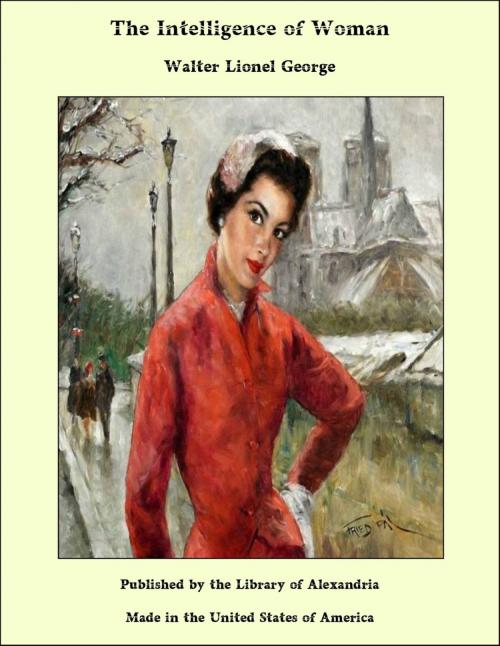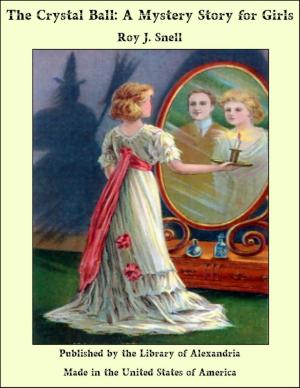The Intelligence of Woman
Nonfiction, Religion & Spirituality, New Age, History, Fiction & Literature| Author: | Walter Lionel George | ISBN: | 9781465625328 |
| Publisher: | Library of Alexandria | Publication: | March 8, 2015 |
| Imprint: | Language: | English |
| Author: | Walter Lionel George |
| ISBN: | 9781465625328 |
| Publisher: | Library of Alexandria |
| Publication: | March 8, 2015 |
| Imprint: | |
| Language: | English |
Men have been found to deny woman an intellect; they have credited her with instinct, with intuition, with a capacity to correlate cause and effect much as a dog connects its collar with a walk. But intellect in its broadest sense, the capacity consecutively to plan and steadfastly to execute, they have often denied her. The days are not now so dark. Woman has a place in the state, a place under, but still a place. Man has recognized her value without coming to understand her much better, and so we are faced with a paradox: while man accords woman an improved social position, he continues to describe her as illogical, petty, jealous, vain, untruthful, disloyal to her own sex; quite as frequently he charges her with being over-loyal to her own sex: there is no pleasing him. Also he discerns in this unsatisfactory creature extreme unselfishness, purity, capacity for self-sacrifice. It seems that the intelligence of man cannot solve the problem of woman, which is a bad sign in a superior intelligence. The trouble lies in this: man assumes too readily that woman essentially differs from man. Hardly a man has lived who did not so exaggerate. Nietzsche, Schopenhauer, agreed to despise women; Napoleon seemed to view them as engines of pleasure; for Shakespeare they may well have embodied a romantic ideal, qualified by sportive wantonness. In Walter Scott, women appear as romance in a cheap edition; Byron in their regard is a beast of prey, Doctor Johnson a pompous brute and a puritanical sensualist. Cervantes mixed in his romantic outlook a sort of suspicious hatred, while Alexandre Dumas thought them born only to lay laurel wreaths and orange blossoms (together with coronets) on the heads of musketeers. All, all—from Thackeray, who never laid his hand upon a woman save in the way of patronage, to Goethe, to Dante, to Montaigne, to Wellington—all harbored this curious idea: in one way or another woman differs from man. And to-day, whether we read Mr. Bernard Shaw, Mr. George Moore, M. Paul Bourget, or Mr. Hall Caine, we find that there still persists a belief in Byron's lines:—"What a strange thing is man! And what a stranger Is woman!" Almost every man, except the professional Lovelace (and he knows nothing), believes in the mystery of woman. I do not. For men are also mysterious to women; women are quite as puzzled by our stupidity as by our subtlety. I do not believe that there is either a male or a female mystery; there is only the mystery of mankind. There are to-day differences between the male and the female intellect; we have to ask ourselves whether they are absolute or only apparent, or whether they are absolute but removable by education and time, assuming this to be desirable. I believe that these differences are superficial, temporary, traceable to hereditary and local influences. I believe that they will not endure forever, that they will tend to vanish as environment is modified, as old suggestions cease to be made. This leads us to consider present idiosyncrasies in woman as a sex, her apparently low and apparently high impulses, her exaltations, and, in the light of her achievements, her future. I do not want to generalize hastily. The subject is too complex and too obscure for me to venture so to do, and I would ask my readers to remember throughout this chapter that I am not laying down the law, but trying only to arrive at the greatest possible frequency of truth. This is a short research of tendencies. There are human tendencies, such as belief in a divine spirit, painting pictures, making war, composing songs. Are there any special female tendencies? Given that we glimpse what distinguishes man from the beast, is there anything that distinguishes woman from man? In the small space at my disposal I cannot pretend to deal extensively with the topic. One reason is the difficulty of securing true evidence.
Men have been found to deny woman an intellect; they have credited her with instinct, with intuition, with a capacity to correlate cause and effect much as a dog connects its collar with a walk. But intellect in its broadest sense, the capacity consecutively to plan and steadfastly to execute, they have often denied her. The days are not now so dark. Woman has a place in the state, a place under, but still a place. Man has recognized her value without coming to understand her much better, and so we are faced with a paradox: while man accords woman an improved social position, he continues to describe her as illogical, petty, jealous, vain, untruthful, disloyal to her own sex; quite as frequently he charges her with being over-loyal to her own sex: there is no pleasing him. Also he discerns in this unsatisfactory creature extreme unselfishness, purity, capacity for self-sacrifice. It seems that the intelligence of man cannot solve the problem of woman, which is a bad sign in a superior intelligence. The trouble lies in this: man assumes too readily that woman essentially differs from man. Hardly a man has lived who did not so exaggerate. Nietzsche, Schopenhauer, agreed to despise women; Napoleon seemed to view them as engines of pleasure; for Shakespeare they may well have embodied a romantic ideal, qualified by sportive wantonness. In Walter Scott, women appear as romance in a cheap edition; Byron in their regard is a beast of prey, Doctor Johnson a pompous brute and a puritanical sensualist. Cervantes mixed in his romantic outlook a sort of suspicious hatred, while Alexandre Dumas thought them born only to lay laurel wreaths and orange blossoms (together with coronets) on the heads of musketeers. All, all—from Thackeray, who never laid his hand upon a woman save in the way of patronage, to Goethe, to Dante, to Montaigne, to Wellington—all harbored this curious idea: in one way or another woman differs from man. And to-day, whether we read Mr. Bernard Shaw, Mr. George Moore, M. Paul Bourget, or Mr. Hall Caine, we find that there still persists a belief in Byron's lines:—"What a strange thing is man! And what a stranger Is woman!" Almost every man, except the professional Lovelace (and he knows nothing), believes in the mystery of woman. I do not. For men are also mysterious to women; women are quite as puzzled by our stupidity as by our subtlety. I do not believe that there is either a male or a female mystery; there is only the mystery of mankind. There are to-day differences between the male and the female intellect; we have to ask ourselves whether they are absolute or only apparent, or whether they are absolute but removable by education and time, assuming this to be desirable. I believe that these differences are superficial, temporary, traceable to hereditary and local influences. I believe that they will not endure forever, that they will tend to vanish as environment is modified, as old suggestions cease to be made. This leads us to consider present idiosyncrasies in woman as a sex, her apparently low and apparently high impulses, her exaltations, and, in the light of her achievements, her future. I do not want to generalize hastily. The subject is too complex and too obscure for me to venture so to do, and I would ask my readers to remember throughout this chapter that I am not laying down the law, but trying only to arrive at the greatest possible frequency of truth. This is a short research of tendencies. There are human tendencies, such as belief in a divine spirit, painting pictures, making war, composing songs. Are there any special female tendencies? Given that we glimpse what distinguishes man from the beast, is there anything that distinguishes woman from man? In the small space at my disposal I cannot pretend to deal extensively with the topic. One reason is the difficulty of securing true evidence.















